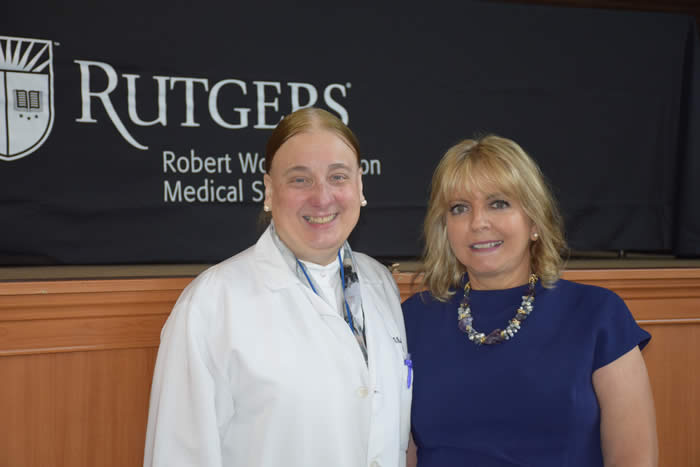Rutgers Panelists: Increasing Awareness, Ending Stigma Is Critical in Addressing Perinatal/Postpartum Depression
Former NJ First Lady Mary Jo Codey Shares Her Story, Insights
 NEW BRUNSWICK, NJ – As many as one in seven women experience postpartum depression, according to a study in JAMA Psychiatry; but despite its frequency and the overwhelming success rates of treatment, the vast majority of women—up to 85 percent—receive no professional treatment for the condition. Experts at a recent forum on perinatal/postpartum depression say a change is long overdue, calling for increased awareness among women and clinicians, advocacy, and systemic changes in the approach to collaborative treatment. NEW BRUNSWICK, NJ – As many as one in seven women experience postpartum depression, according to a study in JAMA Psychiatry; but despite its frequency and the overwhelming success rates of treatment, the vast majority of women—up to 85 percent—receive no professional treatment for the condition. Experts at a recent forum on perinatal/postpartum depression say a change is long overdue, calling for increased awareness among women and clinicians, advocacy, and systemic changes in the approach to collaborative treatment.
“A Discussion on Postpartum Depression,” an interprofessional education program sponsored by Rutgers Robert Wood Johnson Medical School’s Women’s Health Institute and Robert Wood Johnson University Hospital, aimed to increase awareness of the condition, what women’s health care providers should be looking for in their patients, and the active role they should take in identifying women in need of these services and ensuring they are linked to appropriate care.
“As a maternal health provider and educator, I believe it is imperative for us to bring more light to this issue,” said Dr. Gloria A. Bachmann, director of the Women’s Health Institute and professor and interim chair of the Department of Obstetrics, Gynecology and Reproductive Sciences at Robert Wood Johnson Medical School. “As clinicians, we need to understand the signs, however subtle, of a potential problem and be able to act when we think someone needs help, to get them the help they need. As educators, we need to promote better awareness and education on the issue to future clinicians as a means not only of increasing women’s access to these vital services, but helping reduce the stigma associated with seeking help.”
The hour-long discussion on June 8 was kicked off by a powerful first-person account from Mary Jo Codey, former First Lady of New Jersey, whose advocacy and efforts contributed in no small part to the passage of New Jersey’s Postpartum Depression Screening Bill a decade ago. Codey, who struggled with this devastating condition in conjunction with the birth and pregnancy of her sons, Kevin and Chris, detailed the hopelessness, shame, and fear she felt in the grips of a depression that caused “impulsive, terrifying thoughts” of harming her child and herself that intruded “day and night, all the time.”
Codey said she wasted a lot of time blaming herself for what she believed was a personal failure.
“I was so ashamed. I felt so isolated and alone,” she told the audience, noting that the stigma associated with the condition, and with mental health services in general, is the “biggest battle” that still needs to be faced.
“Stigma is such an important problem—getting people to understand this is a medical problem we need to address and can’t sweep under the rug,” agreed Dr. Matthew Menza, chair of the Department of Psychiatry at Robert Wood Johnson Medical School and one of the panelists at the event. “We really need to be thinking about this from the patient’s point of view. Because of the stigma that still exists, women are afraid and embarrassed to bring it up. It’s a very difficult thing to talk about. We need to work on these issues, in addition to what we can work on systematically as an institution.
“As a system, we need to get people access to appropriate care,” Dr. Menza continued. “There’s a hierarchy of treatment; women need access to people who understand what the appropriate treatment is for their condition and how to step through those treatments.”
In addition to Dr. Menza, the panel featured Dr. Charletta Ayers, chief of the division of general obstetrics and gynecology at the medical school, who served as moderator; Dr. Mayra Cruz Ithier, a fellow in the medical school’s division of maternal-fetal medicine; Kathy Mahoney, perinatal clinical nurse specialist with Robert Wood Johnson University Hospital; Adrienne Simonds, assistant professor of rehabilitation and movement sciences at Rutgers School of Health Related Professions; and Dr. Anthony Tobia, associate professor of psychiatry at the medical school.
They stressed the value of novel initiatives to identify and treat perinatal depression, as well as the importance of empathy and truly listening to patients to help identify individuals who might not necessarily score high on the Edinburgh Postnatal Depression Scale, the standard screening tool, but who still may be in need of services.
In addition, Codey is advocating for the passage of the federal “Bringing Postpartum Depression Out of the Shadows Act,” introduced in the House of Representatives in July 2015 and the Senate in November 2015, which aims to increase and improve screening and treatment for women with perinatal/postpartum depression through state grants designed to expand access to these services.
--#--
PHOTO CAPTION: Dr. Gloria A. Bachmann, professor and interim chair of Rutgers Robert Wood Johnson Medical School's Department of Obstetrics, Gynecology and Reproductive Sciences, and director of its Women's Health Institute, stands with Mary Jo Codey, former First Lady of New Jersey and staunch women's health advocate, following a special event on perinatal/postpartum depression.
|
